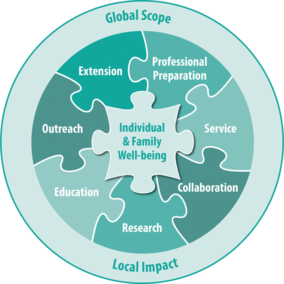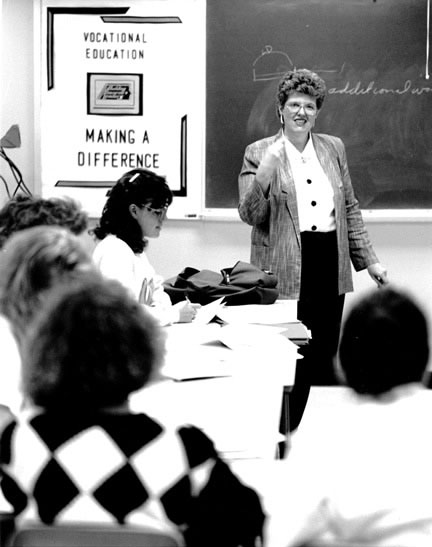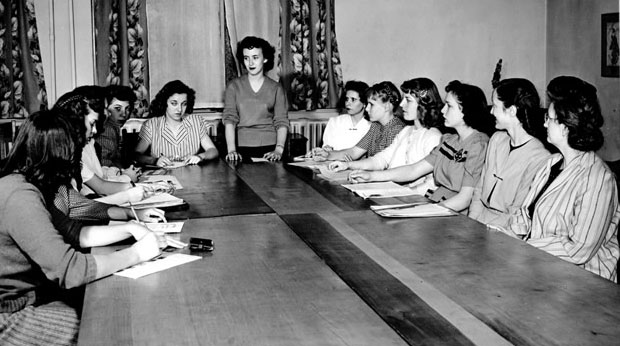Child, Youth and Family Studies is committed to enhancing the well-being of children, youth, adults and families in the state, nation and world by improving the environments in which they live and learn.

CYAF will be respected across the state, nation, and world for:
- Our premier program in Early Childhood Education.
- Strengthening families and promoting individual and family well-being in our research, teaching, outreach, and extension.
- Creating a global citizenry with applied understanding of how global issues impact children, youth, and families locally and how local issues impact children, youth and families globally.
- Interdisciplinary collaboration that uniquely positions us to address current and emerging issues for broader impact in teaching, research, extension, and outreach.
- Innovation in educational programming and service delivery.
- Integrating the human dimension in all disciplines and sciences.
- Our scholarship, research and outreach regarding the unique needs of military children, youth and families.
Our Heritage

In 1962, the College of Home Economics had five departments: Family Economics & Management, Home Economics Education, Human Development and the Family, Textiles, Clothing and Design, and Food and Nutrition, the first three being the historical roots of the current Department of Child, Youth and Family Studies. However, our history dates back even further, to 1905, when the first University Extension course was offered in home economics teacher training. Household Administration became an area of study in 1912 which was a predecessor to coursework in Home Management and Consumer Sciences. A new area of study in child care and training was added in 1925 with a laboratory on the second floor of the new Human Sciences Building. Vocational education, general teaching, extension and social work became a part of the curriculum in 1928. Housing, budgeting, savings and investing, as extension programs for the family, were added in the 1930s.
In 1964, two home management houses were constructed as laboratory space for the Department of Family Economics and Management. One house featured low income living, the other, moderate. Babies were “borrowed” for the home management houses from the State Home for Children. The mid-sixties brought the “Homemaking Unlimited” motor coach which was the only traveling exhibit displaying adaptations that could be made in the home for disabled homemakers.
In 1971 Home Economics Education and Family Economics and Management were merged and became Education and Family Resources; a name which was changed in 1985 to Consumer Sciences and Education. In the 1970s the first extension specialist position in family life was established and the UNO Department of Home Economics officially merged with the College of Home Economics at UNL, substantially expanding the size of the faculty.

A joint post baccalaureate program with Counseling Psychology began in 1976. This laid the foundation for the eventual establishment of the Marriage and Family Therapy (MFT) graduate program in 1989.
The Department of Family and Consumer Sciences was established in July 1992, merging the departments of Human Development with Family and Consumer Sciences and Education.
In 1999, the Department formalized a collaborative training relationship with the Department of Family Medicine at the University of Nebraska Medical Center (UNMC) by receiving Board of Regents approval for a jointly administered post-degree certificate program in Medical Family Therapy. This laid the foundation for a doctoral specialization in Medical Family Therapy that accepted its first class of students in 2009.
CYAF faculty were engaged in the first programming efforts of the Great Plains IDEA (Interactive Distance Education Alliance). The first inter-institutional master's degree program Specialization in Family Financial Planning received approval in 2001. Graduate Specializations in Youth Development, Family and Consumer Sciences Education, and Family and Community Services followed. CYAF is currently developing an undergraduate program in Early Childhood Education through the Great Plains IDEA consortium. Successes in these on-line programming efforts have also lead to other on-line programming successes. For example, the inter-institutional program Specialization in HFSA (Human and Family Services Administration), between CYAF and UNO’s School of Public Administration, was approved in 2010. In 2011, Memorandums of Understanding were signed with universities in Australia, China, and India to create the Global Consortium for International Family Studies (GCIFS). The department currently offers a masters degree specialization in International Family Studies through this consortium.

Other important developments in the history of CYAF:
- In 2003, the Department offices moved from the Human Sciences Building on East Campus to Mabel Lee Hall on City Campus.
- The Department of Family and Consumer Sciences changed its name to The Department of Child, Youth and Family Studies in 2007.
- In 2010 a decision was made to realign our resources to better serve the entire state of Nebraska by moving three faculty members housed at the University of Nebraska-Omaha campus to UNL. This resulted in a decision to close the Omaha program as of fall 2012.